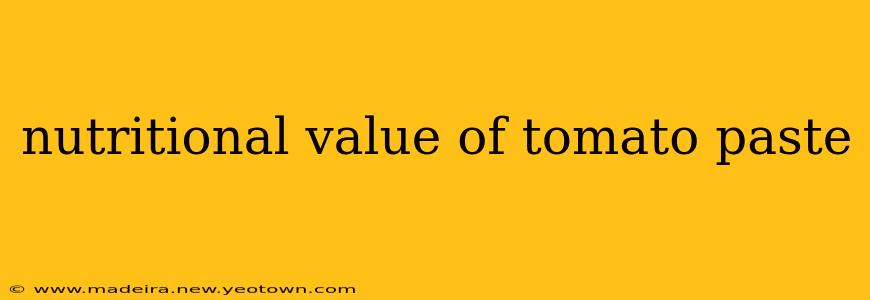Unlocking the Nutritional Powerhouse: A Deep Dive into Tomato Paste
Tomato paste, that humble, concentrated essence of summer's bounty, is far more than just a culinary staple. It's a nutritional powerhouse packed with vitamins, minerals, and antioxidants, quietly boosting the health benefits of countless dishes. But what exactly is packed into those little cans? Let's unravel the nutritional secrets of tomato paste and discover why it deserves a prominent place in your healthy eating habits.
Our journey into the world of tomato paste begins with understanding its origins. Made by simmering ripe tomatoes until most of their water evaporates, it boasts a highly concentrated flavor and a nutritional profile that surpasses that of fresh tomatoes in certain aspects. This concentration is key to understanding its nutritional value.
What are the key nutrients in tomato paste?
Tomato paste is a rich source of lycopene, a potent carotenoid antioxidant linked to numerous health benefits. Lycopene is responsible for the vibrant red color of tomatoes and is even more bioavailable (easier for your body to absorb) when tomatoes are processed, as in the case of paste. In addition to lycopene, tomato paste offers a good dose of vitamin C, vitamin K, potassium, and manganese.
How many calories are in tomato paste?
A single tablespoon of tomato paste typically contains around 15-20 calories. This makes it a relatively low-calorie ingredient, perfect for those watching their weight. However, remember that added ingredients, like oils or sugars, can significantly increase the calorie count, so always check the nutrition label.
Is tomato paste good for weight loss?
The low calorie count and high fiber content of tomato paste make it a potential ally in weight management strategies. The fiber promotes satiety, helping you feel fuller for longer, and potentially reducing overall calorie intake. However, weight loss is complex and depends on a balanced diet and regular exercise, not just one single ingredient.
What are the health benefits of tomato paste?
The abundance of lycopene in tomato paste is its star attribute, associated with a reduced risk of several chronic diseases, including heart disease, certain cancers, and age-related macular degeneration. Beyond lycopene, the vitamins and minerals in tomato paste contribute to overall health and well-being. Vitamin C supports the immune system, vitamin K is crucial for blood clotting, potassium aids in maintaining healthy blood pressure, and manganese supports bone health and metabolism.
How much tomato paste should I eat per day?
There's no single "magic number" for daily tomato paste consumption. Moderate inclusion in your diet is perfectly safe and beneficial. Consider incorporating it into your cooking regularly—a tablespoon here or there in sauces, stews, or even as a base for homemade pizza sauce adds nutritional value without overwhelming your daily intake.
Is there a difference between tomato paste and tomato puree?
Yes, there's a significant difference. Tomato paste is highly concentrated, with most of the water removed, resulting in a thick, intense flavor. Tomato puree, on the other hand, is less concentrated and retains more of the original tomato's water content, resulting in a smoother, less intense flavor. Both are nutritious, but tomato paste boasts a higher concentration of lycopene and other nutrients per serving.
Can tomato paste be part of a healthy diet?
Absolutely! Tomato paste's nutritional profile, low calorie count, and versatile culinary applications make it a valuable addition to any healthy eating plan. Its ability to add depth of flavor to dishes without significantly increasing calorie intake makes it a smart choice for both seasoned cooks and those just starting their culinary journey.
In conclusion, tomato paste is much more than just a cooking ingredient; it's a concentrated source of vital nutrients that contribute to overall health and well-being. By understanding its nutritional profile and incorporating it wisely into your diet, you can harness its power to enhance your meals and support your health goals. Remember to always check the nutrition label for specific details, especially regarding added ingredients like salt or sugar.

